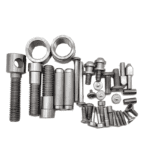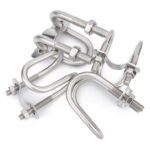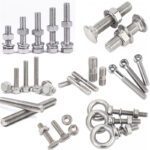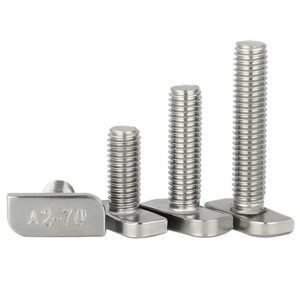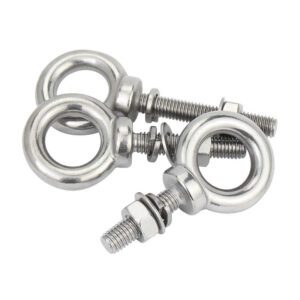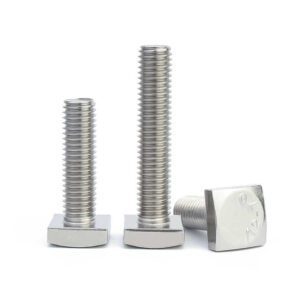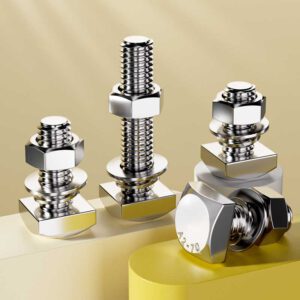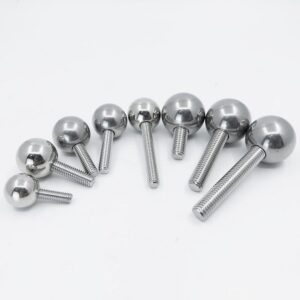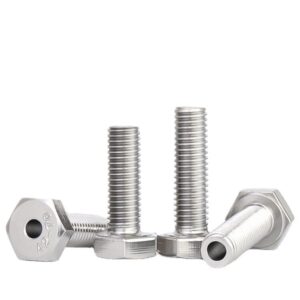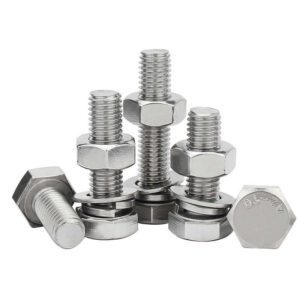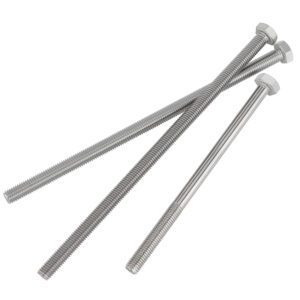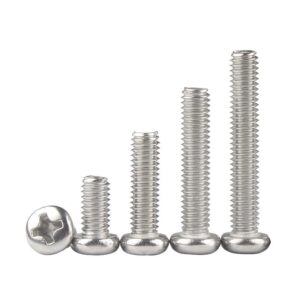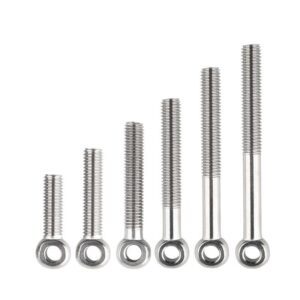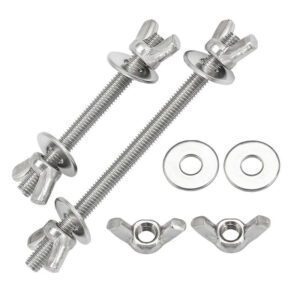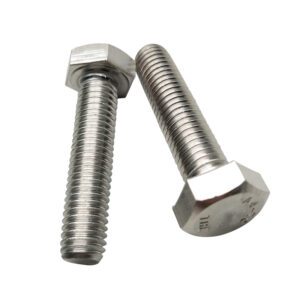- +86 18015401692
- sales@fastenmetal.com
Trusted by Over 1000 Customers All Over the World
Stainless Steel Bolts
The stainless steel we usually we use is austenitic stainless steel. Austenitic stainless steel’s material mainly is SS302,SS304,SS316,etc. FastenMetal is one of the best Stainless Steel Bolts Manufacturers in China. We offer both standard and custom bolts and fasteners to meet different grades and specifications.
- 2 Self-owned Factories
- ISO 9001:2015 certificated
- Hundreds of Suppliers




Gallery of Stainless Steel Bolts
-
SS T bolts for solar panels mounting DIN188
Add to cartStainless Steel T-bolts are a type of bolts used in the mounting of solar panels. They have a “T”-shaped head, which allows them to be easily inserted into slots or channels in solar mounting rails.For quotes,inquiries,or custom bolts and nuts request, please feel free to click the button”get a free quote”.
Material: Stainless Steel 304, 316
Grade:8,10.9,12.8
Standard:din188
Size:M5-M30(Other sizes, please inquiry us)
Deprecated: preg_replace(): Passing null to parameter #3 ($subject) of type array|string is deprecated in /home/u101520528/domains/fastenmetal.com/public_html/wp-includes/kses.php on line 1807
-
Stainless Steel Ring Bolts
Add to cartStainless Steel Ring Bolt is a bolt with a ring attached to its head which made by stainless steel to resistance to rust and corrosion. Also known as lifting bolts. Its main feature is that it can be installed by inserting a rod through the ring, and it is commonly used for lifting or hanging heavy objects, such as in outdoor fences, cranes, and similar settings.For quotes,inquiries,or custom bolts and nuts request, please feel free to click the button”get a free quote”.
Material: Stainless Steel 304, 316
Grade:8,10.9,12.8
Standard:gb825-1988
Size:M5-M30(Other sizes, please inquiry us)
Deprecated: preg_replace(): Passing null to parameter #3 ($subject) of type array|string is deprecated in /home/u101520528/domains/fastenmetal.com/public_html/wp-includes/kses.php on line 1807
-
Stainless Steel Square Head Bolts DIN931
Add to cartStainless steel square head bolts are a kind of bolts with a square-shaped head which made from stainless steel provide excellent resistance to rust and corrosion. , it can be easily gripping with a wrench or tool. These bolts are often used to secure parts with through-holes and are commonly found in heavy-duty applications like construction, machinery, and automotive. Their square head design allows for easy adjustment and reliable fastening in various industrial settings. For quotes,inquiries,or custom bolts and nuts request, please feel free to click the button”get a free quote”.
Material: Stainless Steel 304, 316
Grade:8,10.9,12.8
Standard:DIN931
Size:M5-M30(Other sizes, please inquiry us)
Deprecated: preg_replace(): Passing null to parameter #3 ($subject) of type array|string is deprecated in /home/u101520528/domains/fastenmetal.com/public_html/wp-includes/kses.php on line 1807
-
Stainless Steel Square Head Bolts and Nuts DIN931
Add to cartSquare head bolt is a special type of bolt with a square-shaped head, commonly used for fastening and connecting two components with through-holes. It is a detachable connection which made from stainless steel, square head bolts and nuts offer high strength and resistance to corrosion.For quotes,inquiries,or custom bolts and nuts request, please feel free to click the button”get a free quote”.
Material: Stainless Steel 304, 316
Grade:8,10.9,12.8
Standard:DIN931
Size:M5-M30(Other sizes, please inquiry us)
Deprecated: preg_replace(): Passing null to parameter #3 ($subject) of type array|string is deprecated in /home/u101520528/domains/fastenmetal.com/public_html/wp-includes/kses.php on line 1807
-
SS Ball Head Bolts DIN71802
Add to cartSS ball head bolt, as the name suggests, is a bolt with a ball-shaped head which is made by stainless steel. Ball head bolts also known as a universal joint, it serves as a “joint” used in moving equipment, such as car trunks, bicycles, skateboards, and more.For quotes,inquiries,or custom bolts and nuts request, please feel free to click the button”get a free quote”.
Material: Stainless Steel 304, 316
Grade:8,10.9,12.8
Standard:DIN71802
Size:M5-M30(Other sizes, please inquiry us)
Deprecated: preg_replace(): Passing null to parameter #3 ($subject) of type array|string is deprecated in /home/u101520528/domains/fastenmetal.com/public_html/wp-includes/kses.php on line 1807
-
Stainless Steel Hollow Bolts
Add to cartStainless steel hollow bolt has a structure similar to a regular bolt, typically including a threaded section, bolt head and shank. The difference is that there is a hollow center in the neck, which makes them useful for running wires or holding other materials like rivets.Making from stainless steel which make them strong and corrosion-resistant for tough environments.For quotes,inquiries,or custom bolts and nuts request, please feel free to click the button”get a free quote”.
Material: Stainless Steel 304, 316
Grade:8,10.9,12.8
Standard:DIN444
Size:M5-M30(Other sizes, please inquiry us)
Deprecated: preg_replace(): Passing null to parameter #3 ($subject) of type array|string is deprecated in /home/u101520528/domains/fastenmetal.com/public_html/wp-includes/kses.php on line 1807
-
Stainless Steel Bolts Nuts and Washers
Add to cartStainless steel bolts, nuts, and washers are the go-to choice for anyone needing strong, rust-proof fasteners. They’re perfect for outdoor projects, boats, cars, and places where regular metal might rust or wear out. Stainless steel fasteners stay strong and shiny even in tough weather, so they’ll hold things together securely for a long time. They come in different types, so you can pick the right strength for the job, and they’re pretty much a “fit-and-forget” solution because they last so well.For quotes,inquiries,or custom bolts and nuts request, please feel free to click the button”get a free quote”.
Material: Stainless Steel 304, 316
Grade:8,10.9,12.8
Standard:DIN444
Size:M5-M30(Other sizes, please inquiry us)
Deprecated: preg_replace(): Passing null to parameter #3 ($subject) of type array|string is deprecated in /home/u101520528/domains/fastenmetal.com/public_html/wp-includes/kses.php on line 1807
-
Stainless Steel Long Hex Bolts
Add to cartStainless Steel Long Hex Bolts is a bolt with a hexagonal head, distinguished from a standard hex bolt primarily by its longer length. It is widely used across various fields, known for its ability to withstand high-strength loads and adapt to different environments.Made from stainless steel, they offer strength and rust resistance, making them ideal for both indoor and outdoor use, especially in environments exposed to moisture or chemicals. For quotes,inquiries,or custom bolts and nuts request, please feel free to click the button”get a free quote”.Material: Stainless Steel 304, 316
Grade:8,10.9,12.8
Standard:DIN444
Size:M5-M30(Other sizes, please inquiry us)
Deprecated: preg_replace(): Passing null to parameter #3 ($subject) of type array|string is deprecated in /home/u101520528/domains/fastenmetal.com/public_html/wp-includes/kses.php on line 1807
-
SS Phillips Slotted Round Head Bolts
Add to cartSS Cross Slotted Round Head Bolts are stainless steel bolts featuring a round head with a Phillips slot for easy screwdriver use. Their corrosion-resistant stainless steel construction makes them durable and ideal for both indoor and outdoor applications. These bolts are commonly used in electronics, machinery, and construction, where a secure and rust-resistant fastener is needed.For quotes,inquiries,or custom bolts and nuts request, please feel free to click the button”get a free quote”.
Material: Stainless Steel 304, 316
Grade:8
Standard:DIN444
Size:M5-M30(Other sizes, please inquiry us)
Deprecated: preg_replace(): Passing null to parameter #3 ($subject) of type array|string is deprecated in /home/u101520528/domains/fastenmetal.com/public_html/wp-includes/kses.php on line 1807
-
Stainless Steel Eye Bolts
Add to cartThe Eye Bolt, also known as lifting bolts or eye screws, is a type of bolt featuring a flexible joint. This design allows for some movement during assembly and operation, enabling the bolt to better accommodate connectors of varying sizes. Key standards for Eye Bolts include the standard GB/T798-88 and the German standard DIN444. For quotes,inquiries,or custom bolts and nuts request, please feel free to click the button”get a free quote”.
Material: Stainless Steel 304, 316
Grade:8
Standard:DIN444
Size:M5-M30(Other sizes, please inquiry us)
Deprecated: preg_replace(): Passing null to parameter #3 ($subject) of type array|string is deprecated in /home/u101520528/domains/fastenmetal.com/public_html/wp-includes/kses.php on line 1807
-
Stainless Wall-Penetrating Bolts and Wing Nuts
Add to cartStainless Wall-Penetrating Bolts and Wing Nuts are durable bolts and nuts set designed for secure installation through walls or thick surfaces. Made from stainless steel, they offer high corrosion resistance, making them ideal for both indoor and outdoor applications. The wall-penetrating bolts provide strong, stable support, while the wing nuts allow for easy hand-tightening and adjustments without needing tools. Suitable for construction, mounting heavy items, or any situation where secure wall penetration is required.
Material: Stainless Steel 304, 316
Grade:8
Standard:DIN
Size:M6-M16(Other sizes, please inquiry us)
Deprecated: preg_replace(): Passing null to parameter #3 ($subject) of type array|string is deprecated in /home/u101520528/domains/fastenmetal.com/public_html/wp-includes/kses.php on line 1807
-
Stainless Steel Forged Big Hex Bolts
Add to cartStainless Steel Forged Big Hex Bolts are large, heavy-duty bolts made from stainless steel, providing excellent strength and corrosion resistance. These bolts are created through a forging process, which enhances their durability and toughness, making them suitable for high-stress applications in construction, heavy machinery, and marine environments. The large hexagonal head allows for secure fastening with standard tools, ensuring a strong hold even in challenging conditions.For quotes,inquiries,or custom bolts request, please feel free to click the button”get a free quote”.
Material: 40Cr、35CrMo、42CrMo,Stainless Steel, titanium ,Inconel,etc
Standard:GB/T5782-5783
Finish: As finished
Size:M16-M80
Strength Grade:Grade8.9,10.8.12.8
Deprecated: preg_replace(): Passing null to parameter #3 ($subject) of type array|string is deprecated in /home/u101520528/domains/fastenmetal.com/public_html/wp-includes/kses.php on line 1807
Still not finding what you’re looking for? For fasteners that are unavailable as standard products, or for very specific requirements, we can manufacture custom fasteners and fixings exactly to your specifications or drawings.
About Stainless Steel Bolts
Galvanized vs Stainless Steel Bolts
Galvanized bolts are made from ordinary carbon steel bolts treated with an electroplated coating, while stainless steel bolts are made entirely of stainless steel material. We can choose the right bolts according to following aspects:
Color: Stainless steel bolts, after cleaning or passivation, retain their natural metallic color, offering a sleek and textured appearance. In contrast, galvanized bolts come in various finishes such as black zinc, white zinc, or rainbow zinc, giving them corresponding black, white, or colorful appearances.
Corrosion Resistance: Galvanized bolts have a zinc coating that provides good anti-corrosion and rust-proofing properties. However, over time, this zinc layer may peel off, leading to rust and shortening the bolt’s lifespan. Stainless steel bolts, on the other hand, have inherent corrosion resistance due to their material, offering superior durability and longevity.
Strength and Application: Due to material differences, galvanized bolts generally have lower strength compared to stainless steel bolts. Stainless steel bolts are stronger and suitable for use in high-temperature environments. Therefore, in high-temperature and high-pressure applications, stainless steel bolts are a better choice.
Galvanized bolts are best suited for indoor, dry environments, while stainless steel bolts are more appropriate for humid, high-temperature, and high-pressure conditions. Galvanized bolts are typically used for low-load applications, whereas stainless steel bolts can handle high-strength load demands.
How to identify stainless steel bolts?
1.We can identify whether a bolt is made of carbon steel or stainless steel by using a magnet test or observing its color and gloss. If the bolts are attracted to a magnet, it is made of carbon steel. If it is not attracted to a magnet, it is made of stainless steel.
2.Carbon steel usually have a purple or blue color, with visible traces of iron oxide on the surface, and their gloss is less pronounced. Stainless steel bolts, have a more uniform color, typically gray or silver-white, with a higher surface gloss. Stainless steel does not rust during use, unlike carbon steel, which often shows noticeable surface oxidation.
To distinguish between 304 and 316 stainless steel bolts, the simplest methods include the following:
Magnet Test: 316 stainless steel is nearly non-magnetic, while 304 stainless steel has a little magnetic properties. A magnet can be used to test for material magnetism.
Testing Solution: Specialized stainless steel testing solutions can also be used. For example, Ni8 solution is used for 304 stainless steel, and Mo2 solution for 316 stainless steel. If the solution changes color, it indicates the presence of the corresponding elements.
What grade are stainless steel bolts?
The strength grades of stainless steel bolts are typically divided into three main levels: 8.8, 10.9, and 12.9, representing different ultimate tensile strength limits. Bolts with a grade of 8.8 have an ultimate tensile strength of 800 MPa, those with a grade of 10.9 have 1000 MPa, and those with a grade of 12.9 have 1200 MPa.
Additionally, the performance grades of stainless steel bolts range from 3.6 to 12.9, comprising 10 levels. The first number represents 1/100 of the material’s ultimate tensile strength, while the second number indicates 10 times the ratio of the material’s yield strength to its ultimate tensile strength.
Stainless steel bolts are commonly made from materials like SUS201, SUS304, and SUS316, which offer excellent rust resistance and acid resistance, making them suitable for various corrosive environments. Different materials exhibit variations in strength and corrosion resistance. For instance:
A2-70 stainless steel screws are suitable for applications requiring relatively high strength.
A4-70 screws, with superior corrosion resistance and strength, are ideal for use in corrosive environments.
Torque values for metric stainless steel bolts
As a common type of fastener, Stainless steel bolts are widely used across various industries. During installation, torque control is very important as it directly impacts the fastening performance and safety of the bolts. The recommended torque values for stainless steel bolts vary depending on their size and grade.
- M5 Stainless Steel Bolts: A recommended torque of 2–4 N·m ensures proper fastening while avoiding thread damage from over-tightening.
- M8 Stainless Steel Bolts: A torque range of 5–7 N·m is recommended, meeting the fastening requirements for most applications.
- M16 Stainless Steel Bolts: For this kind of larger size bolts, the torque values depend on the bolt grade:
- Grade 4.8: 104.6 N·m
- Grade 5.8: 130.8 N·m
- Grade 6.8: 156.9 N·m
- Grade 8.8: 209.2 N·m
- Grade 10.9: 294.2 N·m
When selecting the torque value, it’s essential to match it appropriately to the specific grade and application requirements of the bolt.

